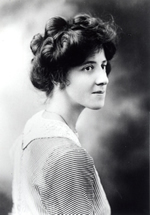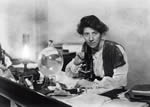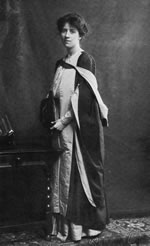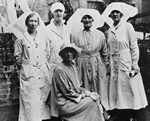
Born: 15 October 1880
Died: 2 October 1958
Defeatism is mortal. Optimism is of the spirit and immortal. I am an optimist. Though loathing the murky misery and disjointed harmony of much in modern life, I see clearly the impelling power of love through life and I recognise a definite trend of evolution to a higher and happier mode of marriage. 1
Marie Stopes was a leading advocate of women's rights and birth control. She was born in Scotland to Henry Stopes and Charlotte Carmichael Stopes. As a young girl, Stopes said she would spend the first twenty years of her life in science, the second twenty years of her life in social projects and the last twenty years of her life writing poetry. 2
In 1902, she graduated with a BSc, having studied botany and geology at the University College London. She earned her PhD in paleobotany in 1904 from the University of Munich and became the youngest doctor of science in Britain when she graduated with her DSc from the University College London. Stopes was the first female academic at the University of Manchester, where she was a lecturer in paleobotany. 3
In 1911, Stopes married a fellow scientist, Reginald Ruggles Gates. The marriage proved disastrous. After a whirlwind romance, the relationship broke down within a year due to Gates' impotence. As Stopes did not believe in divorce, she sought an annulment on the grounds of non-consummation and the annulment was granted in 1914. 4
Due to the failure of her first marriage, Stopes became more interested in sexual matters and increased her knowledge of sexual ethics and the physiology of reproduction. Amongst her formative influences at this time were the works of Havelock Ellis. The experience of her marriage justified her campaign for sexual reform and led to her writing Married Love, published in 1918. 5 Stopes writes:
In my own marriage I paid such a terrible price for sex-ignorance that I feel knowledge gained at such a cost should be placed at the service of humanity. 6
In 1918, Stopes married Humphrey Verdon Roe and their son, the philosopher Harry Stopes-Roe, was born in 1924. Roe shared her interest in birth control. As a manufacturing magnate, Roe had seen the effects frequent childbearing had on his female workforce. 7
On its release, Married Love gave Stopes overnight fame. More than 2000 copies were sold in a fortnight and it was the first sex manual published in the UK. Many letters are available in archival collections that were written by women thanking Stopes for her work and asking for information on birth control. The book was labeled "immoral" and "obscene" by the church, the media and the medical community. 8 In 1935, US academics named Married Love number 16 in a list of the 25 most influential books of the past 50 years.
The originality of Marie Stopes' work is in the expression of the content. She used physiological terms for the first time in a popular work. 9 Stopes herself spoke on the popularity of the work:
Its explosively contagious main theme – that woman like man has the same physiological reaction, a reciprocal need for enjoyment and benefit from union in marriage distinct from the exercise of maternal functions – made Victorian husbands gasp. 10Married Love was followed by the books Wise Parenthood, Radiant Motherhood and Enduring Passion. Wise Parenthood describes methods of family planning. 11
Marie Stopes met American birth control pioneer Margaret Sanger at a meeting at the Fabian Hall in London in mid-July 1915. Sanger discusses this meeting in her book My Fight for Birth Control. The reported rivalry between Stopes and Sanger began when Sanger expressed interested in opening a birth control clinic in London after her clinic in the US was raided by police 9 days after opening. Stopes responded to Sanger in a letter, stating that she and her husband, Humphrey Roe, had been planning on opening their own clinic. 12
Stopes opened the first family planning clinic in the UK on 17 March 1921. The Mothers’ Clinic for Constructive Birth Control was located at 61 Marlborough Rd, Holloway, North London. 13 Financed by Stopes and her husband, the clinic employed only female doctors and nurses to make women patients feel more comfortable. The clinic offered a free service to married women, providing access to birth control for the poor and gathering scientific information about contraception. The clinic dispensed rubber cervical caps designed by Stopes herself. In 1925, the Mothers' Clinic moved to central London and the service expanded to include contraceptives distributed by mail order. Again, Stopes was met with opposition from the Anglican Church, the Catholic Church and the medical community. She opposed this criticism by distributed pamphlets and making speeches advocating her cause. 14
In 1923, a Catholic doctor named Halliday Sutherland libelled Stopes in his book Birth Control. Sutherland argued that birth controllers were using the poor for scientific experimentation. 15 Stopes sued Halliday but lost the case. She then won the case at appeal, and subsequently lost the case in the House of Lords. The case attracted a tremendous amount of publicity. 16 Sutherland referred to Stopes’ doctorate from Munich in an attempt to stir up anti-German feelings in the UK against her. 17
Throughout her life, Stopes used her notoriety to raise awareness of her cause. There is a reported incident where she chained a book about the failings of Catholic birth control methods to Westminster Cathedral. 18
In the 1920s, Stopes opened other family planning clinics, including the world’s first horse-drawn birth control caravan. In 1930 she formed the National Birth Control Council (later known as the Family Planning Association). 19
Marie Stopes died from breast cancer in 1958. In the year of her death, Anglican Bishops at the Lambreth Conference acknowledged the need for birth control, accepting that "procreation was not the sole purpose of Christian marriage". 20 Her legacy is represented through the organisation, Marie Stopes International, bears her name and provides reproductive health services to four million people in over 35 countries at over 452 clinics worldwide. 21
Information about Marie Stopes International is available at on the Marie Stopes International website.
A list of works by or about Marie Stopes is available on Worldcat.
A list of archival material relating to Marie Stopes is available on the UK National Register of Archives website. The archival material includes correspondence, research papers, lecture notes and photographs.

Dr Marie Stopes, n.d.Photograph reproduced with the kind permission of Marie Stopes International, MS01.

Marie Stopes in her laboratory, 1904.
Photograph courtesy of Wikipedia, http://en.wikipedia.org/wiki/
Marie_Stopes

Marie Stopes, the youngest Doctor of Science in Britain, 1905.
Photograph from Hall, R. 1977, Marie Stopes: a biography, Andre Deutsch, London, facing p. 96.

An undated photograph of Marie with a group of nurses at the Mothers' Clinic in Holloway.
Photograph from Marie Stopes: a biography, facing p. 288.
Books written by Marie Stopes and held in the Women’s Health Collection, Curtin University Library are listed below.
Birth Control To-day : a Practical Handbook for Those Who Want to be Their Own Masters in This Vital Matter: 10th ed, Hogarth Press, London, 1953.
Held at Robertson Library Level 6 613.943 STOChange of Life in Men and Women, Putnam, London, 1936.
Held at Robertson Library Level 6 612.665 STOContraception (Birth Control) : Its Theory, History and Practice : A Manual For The Medical And Legal Professions, John Bale, London, 1923.
Held at Robertson Library Level 2 Women's Health 613.94 STOEnduring Passion : Further New Contributions to the Solution of Sex Difficulties Being the Continuation of "Married Love" : 6th ed., Putnam, London, 1936.
Held at Robertson Library Level 2 Closed Collection 306.81 STOThe Human Body, Gill Pub. Co., London, 1926.
Held at Robertson Library Level 6 612 STOMarriage in My Time, Rich & Cowan, London, 1935.
Held at Robertson Library Level 4 306.8 STO
Married Love : a New Contribution to the Solution of Sex Difficulties : 21st ed., Putnam, London, 1933.
Held at Robertson Library Level 4 306.81 STOMother England : a Contemporary History Self-written by Those Who Have Had No Historian, John Bale, London, 1929.
Held at Robertson Library Level 5 362.83 MOT
On Some Aspects of Contraception for Indian Women, Mothers' Clinic for Constructive Birth Control, London, 1952.
Held at Robertson Library Level 2 Women's Health B 613.94 STOPractical Birth Control : On How to Have Healthy Children and Avoid Weakening Pregnancies : 16th ed., Mothers' Clinic, London, 1954.
Held at Robertson Library Level 2 Women's Health B 613.94 STOPractical Notes on Contraceptive Technique, Mothers' Clinic for Constructive Birth Control, London, 1956.
Held at Robertson Library Level 2 Women's Health B 613.94 STORadiant Motherhood : a Book for Those Who Are Creating the Future, G.P. Putnam's Sons, New York, 1920.
Held at Robertson Library Level 2 Women's Health 618 STORoman Catholic Methods of Birth Control, Peter Davies, London, 1933.
Held at Robertson Library Level 4 176 STOSex and the Young, G.P. Putnam's Sons, London, 1926.
Held at Robertson Library Level 6 613.9507 STOSleep, Chatto & Windus, London, 1956.
Held at Robertson Library Level 6 613.79 STO
Some New Concepts and Laws in Human Biology : 3rd ed., Mothers Clinic for Constructive Birth Control, London, 1948.
Held at Robertson Library Level 2 Women's Health B 613.94 STOSome Objections to Contraception Answered, John Bale, London, 1931.
Held at Robertson Library Level 2 Women's Health B 613.94 STOTruth About Venereal Disease : 2nd ed., G.P. Putnam's Sons, London, 1925.
Held at Robertson Library Level 2 Women's Health 616.951 STOWise Parenthood : a Practical Sequel to Married Love : a Book for Married People : 5th ed., G.P. Putnam's Sons, London, 1919.
Held at Robertson Library Level 6 613.94 STO
Wise Parenthood : the Treatise on Birth Control for Married People : a Practical Sequel to Married Love: 24th ed., Putnam, London, 1947.
Held at Robertson Library Level 6 613.94 STOYour Baby's First Year: 2nd ed., Putnam, London, 1949.
Held at Robertson Library Level 6 649.122 STO